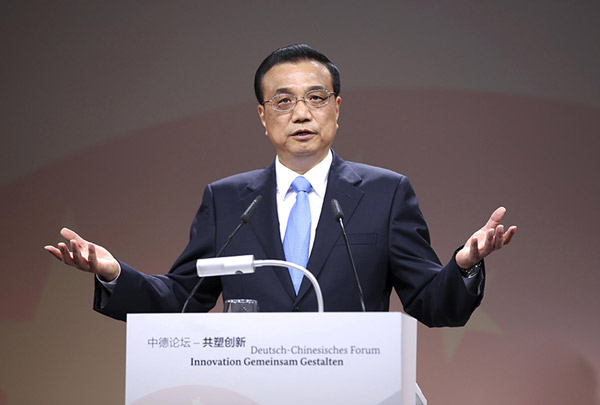

On June 1, 2017, Chinese Premier Li Keqiang and German Chancellor Angela Merkel addressed the “China-Germany Forum: Shaping Innovation Together” in Berlin.
Premier Li Keqiang said that in 2014, the two countries launched a joint action plan themed“shaping innovation together”, which set a precedent for scientific and technological cooperation between major countries. Over the past three years, China and Germany released the “China Strategy” and the “Germany Strategy” respectively. Solid steps have been taken in bilateral innovation cooperation, namely the alignment between“Made in China 2025”plan and Germany‘s Industry 4.0 concept, tripartite cooperation, the successful cooperation model of the Research Funding 2+2, and the rapid development of China-Germany industrial parks. The strong innovation partnership between the two countries has put a high-powered engine to China-Germany pragmatic cooperation, and served as a driving force of China-Europe cooperation.
Premier Li pointed out that China is ready to forge a closer innovation partnership with Germany, calling for improved strategies, enhanced political mutual trust and joint efforts to deal with global challenges. He suggested that the innovation cooperation between the two nations should be market-oriented, and encouraged the two sides to explore new models for commercial development, accelerate the transfer and transformation of applied research and technology, strengthen cooperation on technology research and development as well as manufacturing sector, promote mutual recognition of standards, and better adapt to the upgrading of consumption and industries. He said China is willing to learn from Germany’s experience in fundamental research, adding that China encourages deepened cooperation between their universities and institutions, so as to produce remarkable research accomplishments in cutting-edge sectors.
Premier Li stressed that China encourages all enterprises, small and large, to innovate their businesses or products. Germany has a large number of Hidden Champions, while China is home to hundreds of thousands of high-tech SMEs, which are racing to innovate. He suggested the establishment of a government-level mechanism to facilitate cooperation between SMEs of the two countries. He also called for establishing clusters of Chinese and German enterprises. China and Germany are both active advocators of economic globalization, he said, urging innovators in the two nations to form alliances of intelligent manufacturing, scientific and technological innovation, and vocational education. The Premier encouraged the two sides to step up the exchanges between their students and young scientists and launch intern exchange programs, and wished the first innovation and entrepreneurship week for youth from China and Germany a success.
Chancellor Merkel said innovative economy is of great importance to economic and social development. Germany and China, with many shared interests, uphold free trade and open economy. China has become Germany’s biggest trade partner, with bilateral trade amounting to 170 billion euros in 2016. Mutual investment between the two nations has seen sustainable growth. The Chancellor spoke highly of China’s efforts to relax market access restrictions and protect intellectual properties, and said Germany is willing to work together with China to roll out innovative policies, align innovative and high-tech development strategies, consolidate reciprocal cooperation between large enterprises and SMEs in key fields, deepen collaboration between tertiary and vocational institutions in the two nations, promote mutual recognition of education degrees, launch more applied projects with direct participation of enterprises, and encourage social involvement in the Germany-China innovation partnership. She believed the two nations can work together to better deal with common challenges and make progress.

